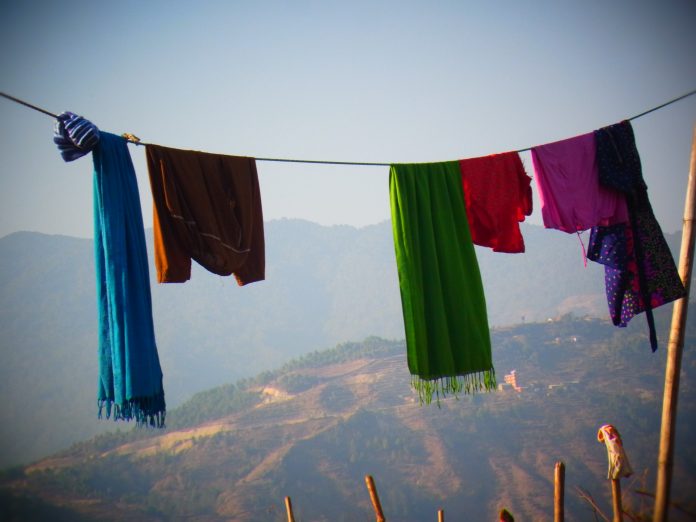What is Nepal typical?
Namaste – is word, which expresses greetings and thankfulness at the same. Traditionally, in Nepal, a conversation begins with the word „Namaste” and a mutual bow with the hands folded gently in front of the heart or on the forehead as a wish for well-being .After that, the tradition suggests asking your interlocutor how the rice was (“Bhat Khayo?”). For us Europeans this question seems a bit bizarre, but for the Nepalese, who are mostly inhabitants of the mountains, rice is an essential element.
In Nepal, it is very common to eat Dhal Bhat every day. This is a dish made of rice and lentils. It provides all-important nutrients; it fills the stomach and gives energy. Considering this, the question “how was rice?” makes a lot more sense. In Germany and in other western countries, the traditional greeting would include a question about the weather rather than the food.
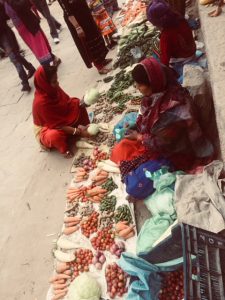
Nevertheless, in Nepal 90 percent of the population consists of farmers living from their own agricultural production. Speaking to a Nepalese the western visitor quickly realizes that nature has another task for them and therefore it is sometimes inappropriate to talk freely about the weather in Nepal, as we do in Europe and in other western countries. Here the weather decides life and death, wellbeing or starvation.
Nepal is a special place since an original contact to nature is still massively present in the lifestyles of its inhabitants. The people know no hustle and deadlines do not play any role in their life. Running up the Himalaya and then walking down through its majestic natural variety, every traveller develops a pure curiosity for the Nepalese and their way to see the world.
The curiosity is mutual. There is a catalogue of usual questions permanently stimulating the flow of conversation with the unknown traveller. Questions such as „What are you doing in Nepal?“, „How often have you visited Nepal?“, „Do you like Nepal?“, and “what about your family” are regularly asked by the locals with genuine curiosity. The Nepalese listens to the answers very carefully, smiling and interrupting the visitors only to offer them some tea.
The questions may look always the same, no matter what ethnicity the locals meet on their way. If you stay longer in Nepal, you will sometimes feel the need to print a T-shirt with these questions on the front and the corresponding answers on the back. In this way, one would not have to repeat the same answers at every tee shop and every corner and could switch to other topics right away. This small sketch let me switch to the next topic: patience. Patience is highly needed in Nepal: the land is a great training camp for patience.

In Nepal, travellers can re-experience, practice and deepen patience and their return in the hectic western world can profit greatly from this experience. No one knows hustle and bustle in the country. Nepal knows only pure tranquillity and peace. Not only the mountains and landscape radiate a sense of infinite rest, but already the manners of its inhabitants inspires a feeling of pure harmony. Calm there is the normality. The slow, leisurely walking and traveling by bus on ailing mountain roads is a wonderful mirror for it: it welcomes the guest in the land of a very patient, hearty people.
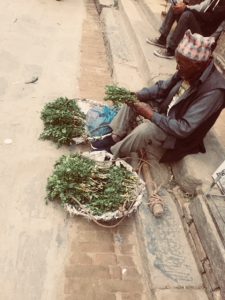
For Nepalese, time is not that important as for Westerners, Nepalese wait patiently for their luggage at the station, their place at the restaurant or their turn in the public offices. In this sense, Nepalese patience is a special form of freedom. In the rocky land, everything is done slowly. Taking a pause while doing a conversation on the phone with a colleague is a usual practice. This could mean a nightmare for any Western businessperson. However, the open encounters with the friendly Nepalese inhabitants and their enchanting smile, forces every stressed traveller to completely re-think their usual idea of time and space, or better yet it forces them to adapt to it, since in Nepal the Western mantra „time is money“ never really arrived.
Hospitality is very important in Nepal, no matter where visitors come from. Endless friendliness and Invitations to parties or to dinner are more than common. In the land, so close to heaven there is always time for a cup of tea with a stranger. This kindness reflects a delightful aspect of an ancient life, which we no longer know in Europe or elsewhere in the Western countries. In Nepal, time is still Zen.
Nepalese are characterized by a great openness and gentleness: they offer themselves spontaneously to accompany travellers in any remote mountain range or simply they love to donate their time to offer help and time.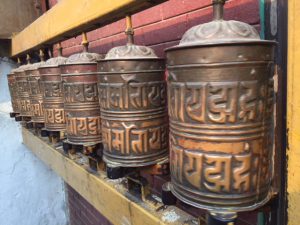
Of course, the scars of tourism which followed the quakes have already drawn the Nepalese faces and in many places the so called „money and chocolate hands“ are overwhelming the tourists. However, the fault of that situation is of the stressed tourists themselves, who unfortunately do not think enough about the consequences of their actions. In the tight holiday season, the trip through the Himalaya must be quick and meticulously planned.
Handing out money and chocolates along the way looks like a practical and easy solution to get in contact with the inhabitants of the villages in the mountains. However, this behaviour has no meaningful effect and often reveals counterproductive. As a result, locals think that all tourists are armed with countless banknotes and the western hikers do not carry clothes and books in their backpack but chocolates and money- for this reason every traveller crossing the Himalaya should be more wise and try to spend some meaningful time with locals instead of offering them chocolate, and if that is not possible, it would be better just to smile, greet and move on.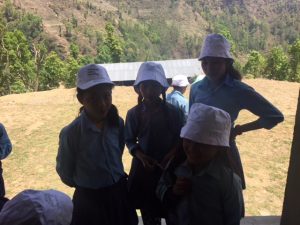
Alternatively, of course, they can give a contribution by participating to our project Karmapfad. This can be done in the form of a donation or, even better, by your personal participation on site .We ‘ re just waiting for you since we know we are all one.
A hearty Namaste to everyone !

